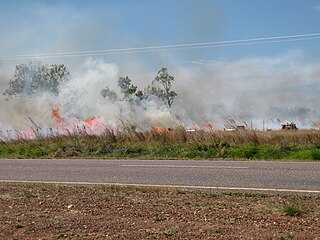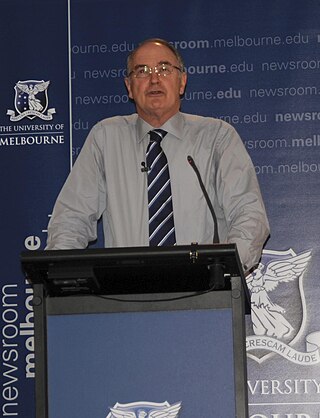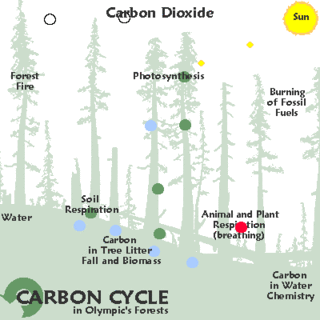
Steve Hatfield Dodds (born Stephen Dodds) is an Australian philosophical economist, with notable work in the social cost of economic decision-making and particularly sustainable development and the economic impact of climate change.

Steve Hatfield Dodds (born Stephen Dodds) is an Australian philosophical economist, with notable work in the social cost of economic decision-making and particularly sustainable development and the economic impact of climate change.
In 2000, Hatfield Dodds gained his PhD in Economics from the Australian National University in Canberra, after submitting a thesis, From consumerism to sustainable development: essays on progress, well-being and limits in economic thought.
Soon after graduating, and joining the Australian Government's Treasury, Hatfield Dodds was seconded to the Canadian Department of Finance for several years and lived in Ottawa with his family.
On returning to Australia, he held positions in The Allen Consulting Group, Environment Australia, and the Australian National University.
He worked with, and advised on:
He joined Australia's Commonwealth Scientific and Industrial Research Organisation (CSIRO) in 2002, [1] and in 2003 became Senior Researcher in the Integration Science and Public Policy office, CSIRO Sustainable Ecosystems. In 2008 he joined the newly formed Commonwealth Department of Climate Change.
In the December 2007 report Leader, follower or free rider? touted [2] as of similar importance to Sir Nicholas Stern's Stern Review on the Economics of Climate Change for the Government of the United Kingdom (to which he contributed a submission), Hatfield Dodds as lead author argued for deep cuts in Australia's greenhouse gas emissions in the next 40 years (to 2050) and that the economic costs are modest and manageable and, indeed, preferable to the consequences of not acting. "It is much more disruptive and costly to step up action than to relax it so it is better to start off with the most stringent target you can imagine and that is what we have modelled... ". [2] [3]
In 2022, the Albanese government commissioned an Independent Review of Australian Carbon Credit Units, that reported in December 2022. The independent panel was comprised of Professor Ian Chubb AC (Chair), the Hon Dr Annabelle Bennett AC SC, Ms Ariadne Gorring and Dr Stephen Hatfield Dodds. [4]
The Bulletin magazine's 28 October 2003 edition named Hatfield Dodds in its inaugural 'Smart 100' list of leading Australian innovators.

The Australian Conservation Foundation (ACF) is Australia's national environmental organisation, launched in 1965 in response to a proposal by the World Wide Fund for Nature for a more co-ordinated approach to sustainability.

Nicholas Herbert Stern, Baron Stern of Brentford, is a British economist, banker, and academic. He is the IG Patel Professor of Economics and Government and Chair of the Grantham Research Institute on Climate Change and the Environment at the London School of Economics (LSE), and 2010 Professor of Collège de France. He was President of the British Academy from 2013 to 2017, and was elected Fellow of the Royal Society in 2014.

The economics of climate change concerns the economic aspects of climate change; this can inform policies that governments might consider in response. A number of factors make this and the politics of climate change a difficult problem: it is a long-term, intergenerational problem; benefits and costs are distributed unequally both within and across countries; and both the scientific consensus and public opinion on climate change need to be taken into account.
The Stern Review on the Economics of Climate Change is a 700-page report released for the Government of the United Kingdom on 30 October 2006 by economist Nicholas Stern, chair of the Grantham Research Institute on Climate Change and the Environment at the London School of Economics (LSE) and also chair of the Centre for Climate Change Economics and Policy (CCCEP) at Leeds University and LSE. The report discusses the effect of global warming on the world economy. Although not the first economic report on climate change, it is significant as the largest and most widely known and discussed report of its kind.

Mark Diesendorf is an Australian academic and environmentalist, known for his work in sustainable development and renewable energy. He currently teaches environmental studies at the University of New South Wales, Australia. He was formerly professor of environmental science and founding director of the Institute for Sustainable Futures at the University of Technology, Sydney and before that a principal research scientist with CSIRO, where he was involved in early research on integrating wind power into electricity grids. His most recent book is Sustainable Energy Solutions for Climate Change.
The social cost of carbon (SCC) is the marginal cost of the impacts caused by emitting one extra tonne of greenhouse gas at any point in time, inclusive of 'non-market' impacts on the environment and human health. The purpose of putting a price on a ton of emitted CO2 is to aid policymakers or other legislators in evaluating whether a policy designed to curb climate change is justified. The social cost of carbon is a calculation focused on taking corrective measures on climate change which can be deemed a form of market failure. Latest studies calculate costs of more than US$300 per ton of CO2. The Intergovernmental Panel on Climate Change suggested that a carbon price from $135 to $5,500/tCO2 in 2030, and from $245 to $13,000 in 2050, would be needed to drive carbon emissions to stay below the 1.5 °C limit.

Greenhouse Solutions with Sustainable Energy is a 2007 book by Australian academic Mark Diesendorf. The book puts forward a set of policies and strategies for implementing the most promising clean energy technologies by all spheres of government, business and community organisations. Greenhouse Solutions with Sustainable Energy suggests that a mix of efficient energy use, renewable energy sources and natural gas offers a clean and feasible energy future for Australia.

Climate change in Australia has been a critical issue since the beginning of the 21st century. Australia is becoming hotter and more prone to extreme heat, bushfires, droughts, floods, and longer fire seasons because of climate change. Since the beginning of the 20th century, Australia has experienced an increase of over 1.4 °C in average annual temperatures, with warming occurring at twice the rate over the past 50 years as in the previous 50 years. Recent climate events such as extremely high temperatures and widespread drought have focused government and public attention on the effects of climate change in Australia. Rainfall in southwestern Australia has decreased by 10–20% since the 1970s, while southeastern Australia has also experienced a moderate decline since the 1990s. Rainfall is expected to become heavier and more infrequent, as well as more common in summer rather than in winter. Water sources in the southeastern areas of Australia have depleted due to the increasing population in urban areas coupled with a persistent prolonged drought.

Ross Gregory Garnaut is an Australian economist, currently serving as a vice-chancellor's fellow and professorial fellow of economics at the University of Melbourne. He is the author of numerous publications in scholarly journals on international economics, public finance and economic development, particularly in relation to East Asia and the Southwest Pacific.

Professor Ross Garnaut led two climate change reviews, the first commencing in 2007 and the second in 2010.

Biosequestration or biological sequestration is the capture and storage of the atmospheric greenhouse gas carbon dioxide by continual or enhanced biological processes.

The economics of climate change mitigation is the part of the economics of climate change related to climate change mitigation, that is actions that are designed to limit the amount of long-term climate change. Mitigation may be achieved through the reduction of greenhouse gas (GHG) emissions and the enhancement of sinks that absorb GHGs, for example forests.
This article is about the Kyoto Protocol and government action in relation to that treaty.
This article is about certain views on the Kyoto Protocol to the United Nations Framework Convention on Climate Change.
The Centre for Climate Change Economics and Policy (CCCEP) is a climate change research centre in England, which studies the economics of global warming. It is hosted jointly by the University of Leeds and the London School of Economics and Political Science (LSE).

Climate change and poverty are deeply intertwined because climate change disproportionally affects poor people in low-income communities and developing countries around the world. Those in poverty have a higher chance of experiencing the ill-effects of climate change due to the increased exposure and vulnerability. Vulnerability represents the degree to which a system is susceptible to, or unable to cope with, adverse effects of climate change including climate variability and extremes.
Citizens' Climate Lobby (CCL) is an international grassroots environmental group that trains and supports volunteers to build relationships with their elected representatives in order to influence climate policy. The CCL is a registered 501(c)(4) with approximately $680,000 in revenue in the United States in 2018. Operating since 2007, the goal of CCL is to build political support across party lines to put a price on carbon, specifically a revenue-neutral carbon fee and dividend (CF&D) at the national level. CCL is supported by notable climate scientists James Hansen, Katharine Hayhoe, and Daniel Kammen. CCL's advisory board also includes former Secretary of State George P. Shultz, former US Representative Bob Inglis, actor Don Cheadle, and RESULTS founder Sam Daley-Harris.

Clive L. Spash is an ecological economist. He currently holds the Chair of Public Policy and Governance at Vienna University of Economics and Business, appointed in 2010. He is also Editor-in-Chief of the academic journal Environmental Values.
Climate-smart agriculture (CSA) is an integrated approach to managing landscapes to help adapt agricultural methods, livestock and crops to the effects of climate change and, where possible, counteract it by reducing greenhouse gas emissions from agriculture, at the same time taking into account the growing world population to ensure food security. Thus, the emphasis is not simply on carbon farming or sustainable agriculture, but also on increasing agricultural productivity. "CSA ... is in line with FAO’s vision for Sustainable Food and Agriculture and supports FAO’s goal to make agriculture, forestry and fisheries more productive and more sustainable".
The history of climate change policy and politics refers to the continuing history of political actions, policies, trends, controversies and activist efforts as they pertain to the issue of global warming and other environmental anomalies. Dryzek, Norgaard, and Schlosberg suggest that critical reflection on the history of climate policy is necessary because it provides 'ways to think about one of the most difficult issues we human beings have brought upon ourselves in our short life on the planet’.